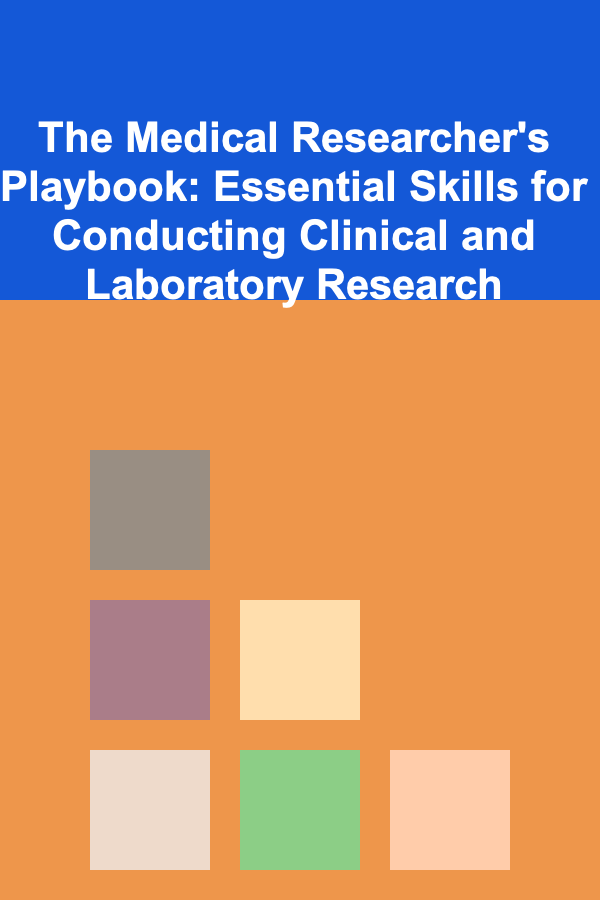
The Medical Researcher's Playbook: Essential Skills for Conducting Clinical and Laboratory Research
ebook include PDF & Audio bundle (Micro Guide)
$12.99$8.99
Limited Time Offer! Order within the next:

Medical research is the cornerstone of advances in healthcare, from developing new treatments and therapies to understanding the underlying causes of diseases. For those in clinical and laboratory settings, the journey of conducting medical research requires a combination of technical skills, critical thinking, attention to detail, and adherence to ethical principles. Whether you're a seasoned researcher or someone starting out in the field, developing a broad skill set is crucial to effectively contribute to the ever-growing body of medical knowledge.
In this actionable guide, we will explore the essential skills required for conducting clinical and laboratory research. By focusing on the competencies needed, from study design to data analysis, ethical considerations, and communication, this guide aims to provide practical insights that can empower medical researchers to approach their work with rigor, precision, and integrity.
Study Design: The Foundation of Research
Understanding Study Types and Methodologies
A strong foundation in study design is essential for any medical researcher. The way a study is designed determines the quality, validity, and reliability of the results. Researchers must be able to select the appropriate study type based on the research question, the population under study, and the nature of the disease or condition being investigated.
- Observational Studies: These studies do not involve interventions. Instead, they observe and analyze the relationships between variables as they naturally occur. Types include cohort studies, case-control studies, and cross-sectional studies.
- Interventional Studies: In these studies, researchers introduce an intervention (such as a drug, therapy, or surgical procedure) and observe the outcomes. Randomized controlled trials (RCTs) are the gold standard in clinical research because they minimize bias and provide high-quality evidence.
- Clinical Trials: These are a subset of interventional studies specifically focused on evaluating new treatments, therapies, or medical devices in humans. Clinical trials are often conducted in phases, from Phase I (safety) to Phase IV (post-market surveillance).
Formulating Research Questions and Hypotheses
Before embarking on a study, researchers must clearly define their research question. A well-defined question guides the entire research process, from study design to data analysis.
- Specific, Measurable, Achievable, Relevant, Time-bound (SMART): Research questions should be specific, measurable, achievable, relevant to the field of study, and feasible within a defined timeline.
- Null and Alternative Hypotheses: Researchers must formulate a null hypothesis (typically stating that there is no effect or relationship between variables) and an alternative hypothesis (suggesting that there is a significant effect or relationship). Testing these hypotheses through rigorous statistical analysis will allow researchers to draw conclusions based on evidence.
Sample Size and Power Calculation
The reliability of research results depends on the sample size used in a study. A study that includes too few participants may lack the statistical power to detect real differences or effects, while an excessively large sample may be inefficient and waste resources.
- Power Analysis: Power analysis is the process of determining the minimum sample size required to detect a statistically significant effect. This analysis takes into account factors like the expected effect size, significance level, and statistical power (usually set at 80% or 90%).
Data Collection and Management: Precision and Accuracy
Designing Reliable Data Collection Tools
The tools and methods used to collect data must be reliable and valid to ensure the accuracy of research findings. Common data collection tools include surveys, questionnaires, clinical assessments, laboratory tests, and diagnostic imaging.
- Validity and Reliability: Validity refers to the extent to which a tool measures what it is intended to measure, while reliability refers to the consistency of results over time. Researchers should select or develop tools that are both valid and reliable.
- Blinding and Randomization: In clinical trials, blinding (where participants and/or researchers are unaware of which group participants belong to) and randomization (randomly assigning participants to different groups) are essential techniques to reduce bias and ensure the integrity of the results.
Ensuring Data Integrity
Data integrity is crucial for producing reliable and reproducible results. Researchers must take steps to ensure that data is accurately recorded, stored, and protected from manipulation.
- Standard Operating Procedures (SOPs): Developing and following SOPs for data collection ensures consistency and reduces human error.
- Electronic Data Capture (EDC): The use of EDC systems allows researchers to collect, store, and manage data electronically. These systems are designed to enhance data quality, reduce errors, and ensure compliance with regulatory standards.
- Data Security and Confidentiality: Especially in clinical research, data security and patient confidentiality are paramount. Researchers should adhere to guidelines such as the Health Insurance Portability and Accountability Act (HIPAA) and implement encryption, access control, and regular audits to protect sensitive data.
Statistical Analysis: Interpreting Data with Precision
Understanding Statistical Methods
Medical research heavily relies on statistics to analyze and interpret data. Researchers must have a solid understanding of statistical techniques and their appropriate application to ensure that findings are robust and meaningful.
- Descriptive Statistics: Descriptive statistics summarize and describe the features of a dataset, such as means, medians, standard deviations, and percentages. These measures provide an overview of the data but do not make inferences about populations.
- Inferential Statistics: Inferential statistics involve drawing conclusions from a sample and making predictions about a population. Common techniques include t-tests, chi-square tests, regression analysis, and analysis of variance (ANOVA).
- Multivariate Analysis: For more complex research questions, researchers may need to conduct multivariate analysis, where multiple variables are considered simultaneously. Techniques like multiple regression or factor analysis help to understand the relationships between variables.
Handling Confounding Variables
In clinical and laboratory research, confounding variables can distort the observed relationship between the exposure and the outcome of interest. Researchers must identify potential confounders and adjust for them during data analysis.
- Statistical Adjustments: Techniques such as stratification or multivariable regression models allow researchers to control for confounders and isolate the effect of the primary variable of interest.
- Sensitivity Analysis: Sensitivity analysis assesses how robust the study findings are to various assumptions, such as changes in the treatment or exposure variable, or the inclusion/exclusion of certain participants.
Ethical Considerations: Upholding Integrity in Research
Ethical Principles in Medical Research
Ethics is a critical aspect of both clinical and laboratory research. Researchers must prioritize the safety, dignity, and well-being of participants while conducting scientifically sound studies.
- Informed Consent: In clinical trials and studies involving human participants, obtaining informed consent is mandatory. Participants must be fully informed about the purpose of the research, potential risks, and their right to withdraw at any time without penalty.
- Confidentiality: Maintaining the confidentiality of participants' personal and medical information is essential. Researchers must take steps to safeguard data and ensure that participants' identities are protected.
- Ethical Review Boards: Research involving human subjects must be reviewed and approved by an Institutional Review Board (IRB) or Ethics Committee to ensure that the study adheres to ethical standards and regulations.
Animal Research Ethics
In laboratory-based research, animal models are often used to investigate disease mechanisms or test new treatments. Ethical guidelines such as the 3Rs principle (Replacement, Reduction, and Refinement) must be followed when conducting animal research.
- Replacement: Whenever possible, researchers should use non-animal methods (e.g., cell cultures, computer models) to achieve research goals.
- Reduction: Efforts should be made to reduce the number of animals used in experiments while still achieving statistically significant results.
- Refinement: Researchers should minimize animal suffering by refining experimental procedures to reduce pain and distress.
Communication and Collaboration: Sharing Knowledge and Insights
Scientific Writing and Publication
Once data has been analyzed, the next step for researchers is to communicate their findings to the broader scientific community. Writing research papers that are clear, accurate, and methodologically sound is essential for disseminating knowledge.
- Journal Selection: Researchers should choose reputable journals that align with the scope of their research. Factors to consider include impact factor, readership, and the journal's focus on the relevant field.
- Clear and Concise Writing: Writing should be structured and straightforward. A typical research paper includes an abstract, introduction, methods, results, discussion, and conclusion. Avoid jargon and focus on presenting the results in a way that is accessible to both specialists and general audiences.
- Peer Review Process: Peer review is a critical part of scientific publishing. Researchers must be prepared to respond to reviewer feedback and make revisions to improve the quality of the paper.
Collaboration and Networking
Medical research is rarely done in isolation. Collaboration with other researchers, institutions, and organizations can enhance the quality and scope of a study.
- Interdisciplinary Collaboration: Collaborating with experts in different fields (e.g., biostatistics, epidemiology, pharmacology) can help ensure that all aspects of the research are well-managed and scientifically rigorous.
- Networking: Attending conferences, seminars, and workshops allows researchers to stay updated on the latest advancements, exchange ideas, and form valuable partnerships.
Conclusion
Conducting high-quality clinical and laboratory research requires a diverse set of skills, including study design, data collection and management, statistical analysis, ethical considerations, and effective communication. By developing these skills and maintaining a rigorous, ethical approach, medical researchers can contribute significantly to advancing knowledge, improving patient outcomes, and driving innovations in healthcare. Through careful planning, precision, and collaboration, researchers can help shape the future of medicine and improve the lives of patients around the world.

How to Implement a Laundry Room Reset Routine
Read More
How to Keep Track of Digital Signatures and Authorizations
Read More
How to Prepare for Common Workshop Challenges and Solve Them
Read More
How to Start a Side Hustle and Manage Finances Effectively
Read More
How to Use Credit Cards Responsibly to Build Your Credit Score
Read More
The Art of Directing: Techniques for Bringing Your Vision to the Screen
Read MoreOther Products

How to Implement a Laundry Room Reset Routine
Read More
How to Keep Track of Digital Signatures and Authorizations
Read More
How to Prepare for Common Workshop Challenges and Solve Them
Read More
How to Start a Side Hustle and Manage Finances Effectively
Read More
How to Use Credit Cards Responsibly to Build Your Credit Score
Read More